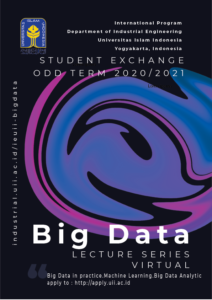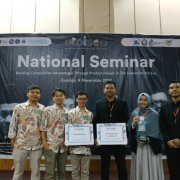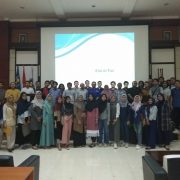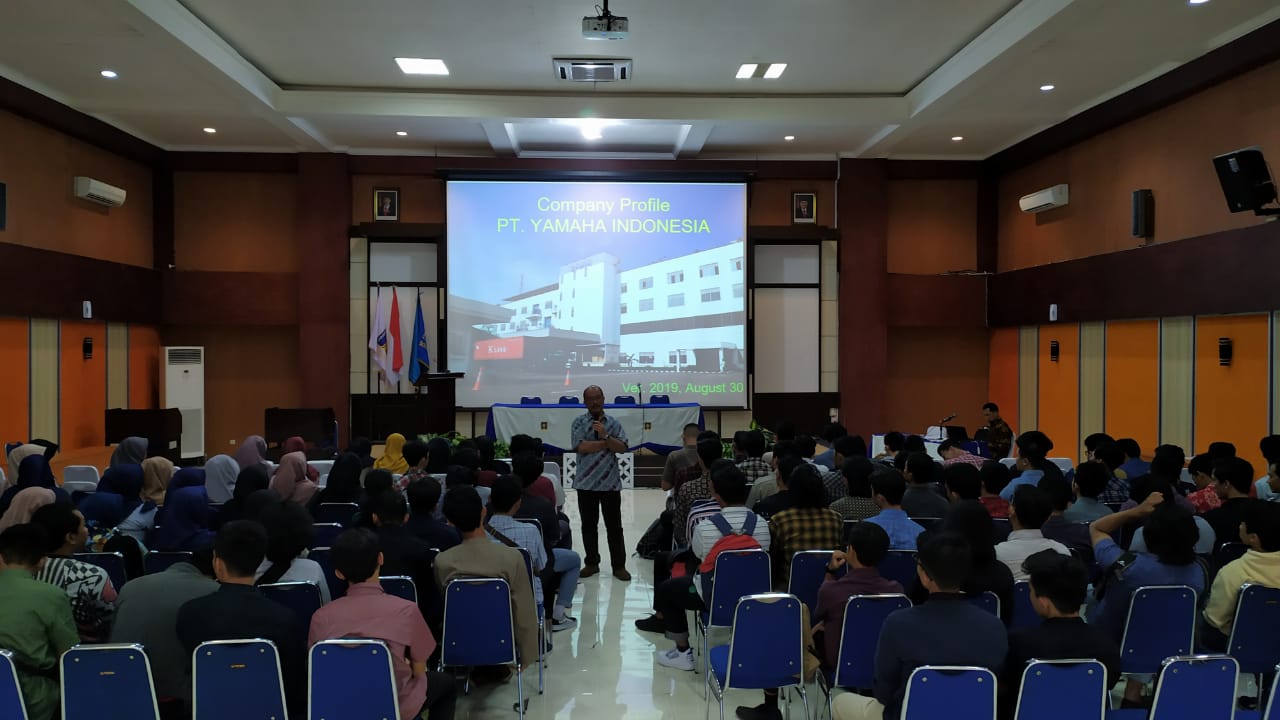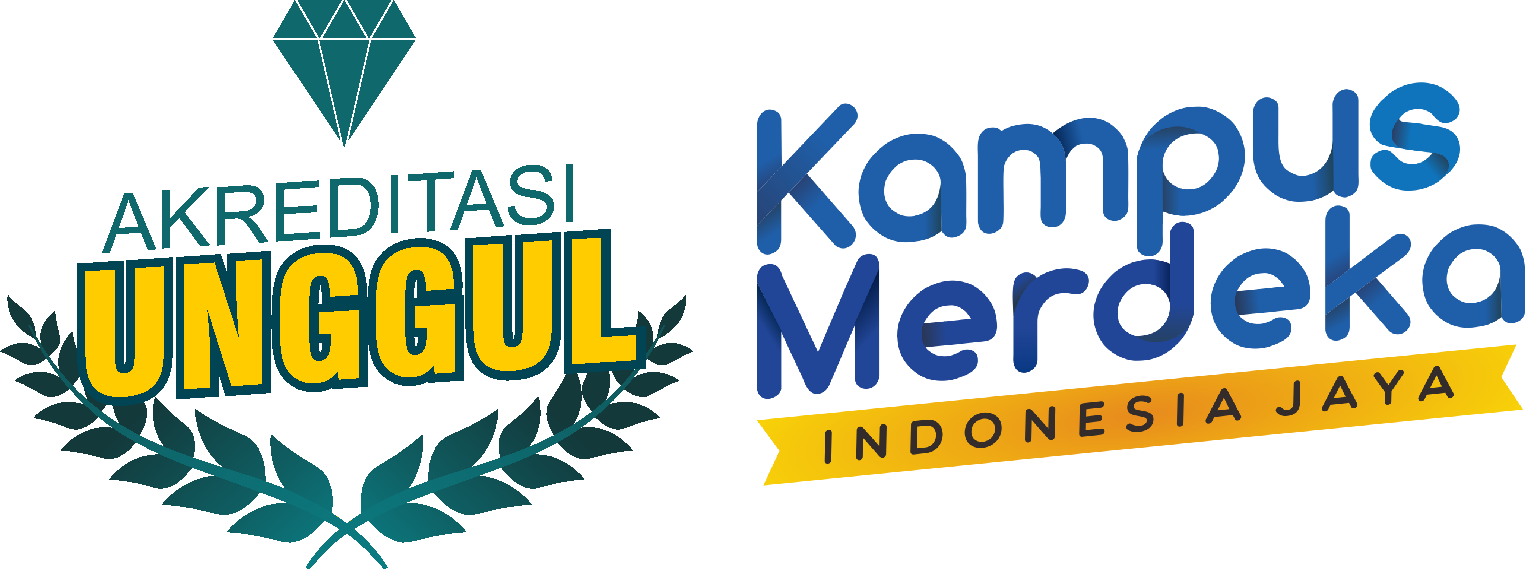This year, Student Creativity Program 2021 or “PKM” (Program Kreativitas Mahasiswa) has been launched. This program is very prestigious that many universities in Indonesia expect to become the winner. It has a big impact on institutions and students involved in the program for the development of their careers.
PKM Corner UII has released a schedule for Internal PKM Selection. The following dates must be highlighted :
| February 16 – 22, 2021 | Internal Systems Selection through https://pkmcorner.uii.ac.id/ |
| February 23-24, 2021 | Internal Review |
| February 25, 2021 | Announcement and Account Release simbelmawa.kemendikbud.go.id |
| February 26, 2021 | Document Completion |
| February 27, 2021 | Upload Deadline |
Then, What is Student Creativity Program/PKM?
Let’s take a look at the following information :
For further information you can visit :
Ministry of Education and Culture of Republik of Indonesia
Introduction
- University graduates should have: academic knowledge, the skill of thinking, management skill, dan communication
- The distinguished attitude that should be demonstrated:
- Creative (unique and gives benefits)
- Constructive (manifestable).
- Product of PKM: creative and constructive
- Process of PKM: the content that is full of knowledge, rich in information, interconnected to meet new ideas, resources management, and able to deliver ideas properly
Fields of PKM
- Research Field (PKM Bidang Riset (PKM-R)
- Enterpreneur Field (PKM Bidang Kewirausahaan (PKM-K))
- Community Service Field (PKM Bidang Pengabdian Kepada Masyarakat (PKM-PM))
- Applied Science and Technology Field (PKM Bidang Penerapan Iptek (PKM-PI))
- Inspiration and Creation Field (PKM Bidang Karsa Cipta (PKM-KC))
- Constructive and Futuristic Ideas Field (PKM Gagasan Futuristik Konstruktif (PKM-GFK))
- Written Ideas Field (PKM Gagasan Tertulis (PKM-GT))
- Scientific Article Field (PKM Artikel Ilmiah (PKM-AI))
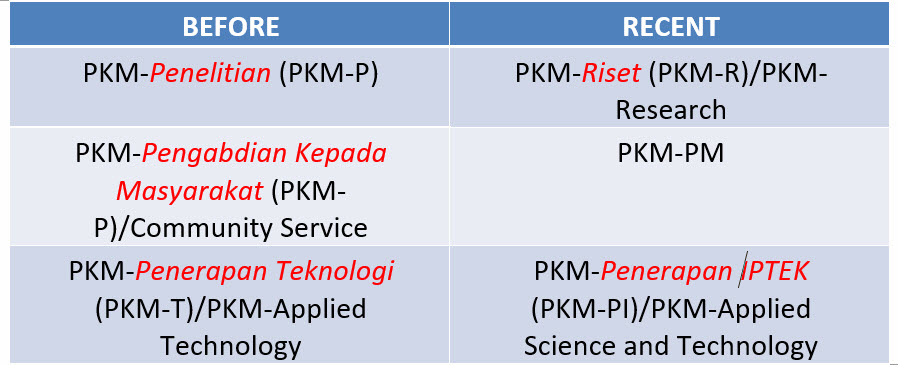
PKM Gagasan Futuristik Konstruktif (PKM-GFK)/PKM For Constructive and Futuristic Ideas , previously was provided with incentive. Recently, it will be accommodated with funding for video creation.
PKM Criteria
|
SCHEME |
CRITERIA | |||||
| Activity | Criteria of Study | Bachelor Degree | Members (College Students)** | Funding (Rp. In Million) |
Output |
|
| PKM-R* | Science and technology-based deep observation to reveal new information | Based on study major, cross major is advised |
S1 |
3-5 |
5-10 |
Progress Report,
Final Report, Scientific paper, and/or product of the program |
| PKM-K* | The product of Science and technology as the commodity of students’ business | Irrelated to study major |
S1 |
3-5 |
5-10 |
Progress Report,
Final Report, Business Product |
| PKM-PM* | Science and technology-based solution (technology /management) for non-profit partner | Irrelated to study major |
S1 |
3-5 |
5-10 |
Progress Report,
Final Report, Scientific paper, and/or product of the program |
| PKM-PI* | Science and technology-based solution (technology /management) for profitable partners | Based on study major, cross major is advised |
S1 |
3-5 |
5-10 |
Progress Report,
Final Report, Scientific paper, and/or product of the program |
| PKM-KC* | The work should be the result of functional idea construction | Based on study major, cross major is advised |
S1 |
3-5 |
5-10 |
Progress Report,
Final Report, Prototype or functional products |
| PKM-GFK* | SDGs and National issues | It is allowed for different study major, cross major is advised |
S1 |
3-5 |
5-10 |
Progress Report,
Final Report, Video that should be uploaded to YouTube |
| PKM-GT* | A paper that contains ideas on future transformation concept | Irrelated to study major |
S1 |
3-5 |
Incentive 3 |
Scientific article that includes the concept of transformation or development |
| PKM-AI | Scientific Article as the result of student’s academic activities | Based on study major, cross major is advised | S1 | 3-5 | Incentive
3 |
Scientific Article |
* The program that will be resumed in the National Student’s Scientific Week/PIMNAS
** In the year of PKM implementation, the participants are still recorded as active students (have not accomplished the bachelor degree yet)
The Objectives of PKM
- To prepare the human resources who oriented to future and being strengthened by the higher education transformation, to be distinguished, competitive, adaptive, flexible, productive, and competitive under the character of Pancasila, that reflect the personality of:
- Aware of and obey the rule
- Creative and innovative
- The cooperative objective in establishing intellectual diversity.
General Characteristics of PKM
- Unlimited topics
- Recent topics are preferable
- And or main topics of SDGs
- Towards independent campus, free in studying
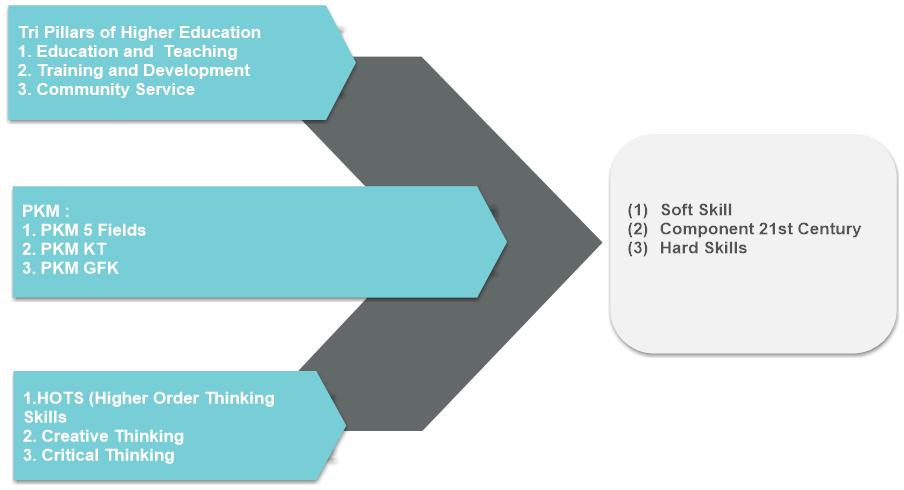
PKM Grouping
- PKM 5 Fields consist of PKM-R, PKM-K, PKM-PM, PKM-PI and PKM-KC
- PKM-Gagasan Futuristik Konstruktif (PKM-GFK)/PKM-Futuristic and Constructive Idea (PKM-GFK)
- PKM-AI and PKM-G
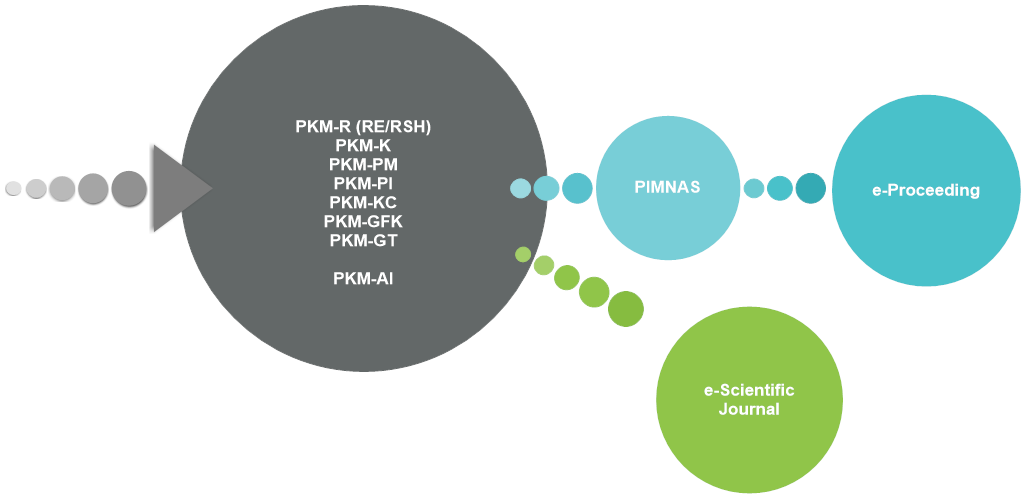
PKM – R
- Topic: Unlimited, the most recent topics are preferable
- Title: Avoid the acronym, unstandardized abbreviation, maximum 20 words.
- PKM-RE: reveals the cause-effect correlation action-reaction, design, exploration, alternative material, attractive product design, blueprint, and others or identification of the active chemical compound.
- PKM-RSH: reveals the cause-effect correlation, descriptive research about social behavior, economics, education, health, or culture either related to local wisdom or contemporary behavior.
• Characteristics of research type:
| No | Types of Research | Characteristics | Examples in the Field of Application |
| 1 | Exact Research | The object of research that emphasized more on natural phenomenon based on the law of physics, chemistry, and biology. | Medical, health, pharmacy, agro, technology, material science, basic sciences, mathematics, and Earth |
| 2 | Social Research | The object of the research that emphasized on the interaction social phenomenon in community, such as economics, human relationship, sociology, management, and politics. | Economics, sociology, psychology, management, politics, and others |
| 3 | Humanities Research | The object of the research that emphasized on the behavior basic aspect in the community | Cultural sciences, art, philosophy, customs, beliefs (religion), law, and ethics |
• Characteristics based on the approach
| No | Types of Research | Characteristics | Examples in the Field of Application |
| 1 | Empirical Research | Research is performed by using pronounced and valid measurement tools for data collecting. The analyzed data is numeric, both for quantitative or qualitative with pronounced and systematic method | Commonly used in the Field of exact and social sciences |
| 2 | Non-Empirical Research | Research is performed with the absence of specific measurement tools that tends to have high subjectivity in data mining or information. A literature review could be classified as the method in this type of research | Commonly used in the field of humanities, although it could also be applied in the field of exact and social sciences |
-
The Method of research:
– Virtual: simulation, artificial intelligence, and others.
– Digital: to establish software or system.
– Online: to collect the data by using the internet, for example online questionnaire, employing existing data set.
– Laboratory research: to perform research in the laboratory under strict health protocol.
-
Types of output:
| No | Category of PKM-R | Research Approach | Research Platform | Output |
| 1 | IPA/Exact Sciences | Empirical | Virtual, digital, online. Laboratory | Original article |
| 2 | IPA/Exact Sciences | Non-empirical | Virtual, digital online | Critical review (Narrative or systematic review) |
| 3 | Social | Empirical | Virtual, digital online, offline | Original article |
| 4 | Social or Humanities | Non-empirical | Virtual, digital online, offline | Critical review |
PKM – K
- Topic: Unlimited, the most recent topics are preferable
- Title: Avoid the acronym, unstandardized abbreviation, maximum 20 words.
- Objective: to nurture the students’ understanding and skill in creating unique commodities and to be a pioneer for profit-oriented entrepreneurship.
- Characteristics: to feature the uniqueness and the benefit of a commodity over profits.
- The main subject is the students, others only play as supporters.
• The Implementation of PKM- K:
- Virtual-digital: the utilization of internet, cellular, social media, search engine, and other, in its correlation to concept drafting and the production of business product.
- Online: For example, online-based marketing for products.
- Offline: the existence of direct interaction without physical interaction, under strict health protocol.
PKM-PM
- Topic: Unlimited, the most recent topics are preferable
- Title: Avoid the acronym, unstandardized abbreviation, maximum 20 words.
- The Objective: to nurture students’ empathy towards issues in society through the implementation of science and technology. The issue is originated from the community, not from students’ hypotheses.
- Partner: small-scale community, unoriented to profit and being proven with the letter of willingness to become a partner (as the attachment of proposal).
The Implementation of PKM-PM
- Virtual-digital: the utilization of internet, cellular, social media, search engine, and others as tools for community service.
- Online: examples, online-based communication with partners.
- Offline: the existence of direct interaction without physical interaction under strict health protocol.
PKM-PI
- Topic: Unlimited, the most recent topics are preferable
- Title: Avoid the acronym, unstandardized abbreviation, maximum 20 words.
- Objective: to disclose the students’ insight on science and technology towards the issues in the profit-oriented business world or community (midwives who own maternity clinic, farmer, fishermen, pedicab drivers, etc).
- The problems should be originated from partners and classified as priority problems, not students’ hypotheses.
- Partners: to provide the letter of willingness in becoming the partner (as the attachment of the proposal)
The Implementation of PKM-PI
- Virtual-digital: the utilization of the internet, cellular, social media, search engine, and others, started from the planning, communication to implementation.
- Online: examples, online-based communication with partners.
- Offline: the existence of direct interaction without physical interaction under strict health protocol.
PKM-KC
- Topic: Unlimited, the most recent topics are preferable
- Title: Avoid the acronym, unstandardized abbreviation, maximum 20 words.
- The objective: to shape students’ ability to create something new and functional on the basis of the intention and common sense.
- The product might not provide direct benefit, but not imitate the existing products.
- It is allowed to modify the principle or feature of an existing product.
The sources of inspiration in PKM-KC, among others:
- The result of research, which reaches the stage of technical design without any tested-ready prototype yet, or else.
- Solution over problems, the needs or challenges encountered by community, government, or business. If the result of research cannot be found as the basis of PKM-PC activity, hence applicative research that produces functional products could be employed and equalized with PKM-KC.
- The development or the improvement of the existing product’s by demonstrating the differences.
The following conditions are unable to be categorized as PKM-KC:
- PKM-R that has resulted in the ready-tested model, yet unable to hit 1:1 scale is still considered unfunctional.
- Generic and specific solution for the business world is concluded in PKM-PI. But, if the solution is classified as non-generic (none of the products with identical specifications has existed in the market), hence the activity is classified as PKM-KC.
PKM-GFK
- Topic: SDGs
- Title: Avoid the acronym, unstandardized abbreviation, maximum 20 words
- Objective: to motivate students’ participation in managing imagination, perception, and common sense, to figure out the futuristic yet constructive management as the effort to accomplish the objective of SDGs in Indonesia and to find the solution on Indonesian apprehension.
PKM-AI
- Topic: Unlimited, the most recent topics are preferable
- Title: Avoid the acronym, unstandardized abbreviation, maximum 20 words.
- The objective: to provide students with experience in composing the scientific writing originated from the group activity in the field of education, research and community service.
PKM – GT
- Topic: Unlimited, the most recent topics are preferable
- Title: Avoid the acronym, unstandardized abbreviation, maximum 20 words.
- The objective: to enhance students’ imagination in responding to the challenges.
- Characteristics: A concept of transformation and/or development from the various aspects, such as nation, futuristic, long-term, that has a potency to be objectified.
STAGES OF PKM 2021
PROPOSAL SUBMISSION
- Each student could involve in more than 2 proposer teams, yet only allowed to involve in 2 funded teams, at the most as the chair-member or member-member. A lecturer could supervise a maximum of 10 proposals.
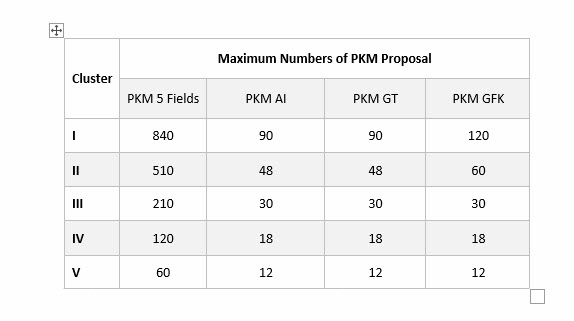
PROPOSAL ASSESSMENT
- Two stages are performed:
- A first stage (1 assessor): the conformity on mandatory administration requirement, the suitability of proposal format, the suitability of selected PKM field.
- A second stage (2 assessors): All processes that are included in the first stage + the level of program creativity that covers several aspects: topics repetition, intellectual challenge weight, and it also emphasizes the aspect of creativity/substantial
PROPOSAL FUNDING
- A Final score for proposal: the total score of both assessors in the second stage.
- If the total reaches above passing grade, then the proposal will be funded by Belmawa.
- University or other parties are allowed to provide the additional funds with a maximum of 25% of the Belmawa fund.
- The stamped-notification letter addressed to Belmawa from the university is a must.
THE IMPLEMENTATION AND PROGRESS REPORT
- The alteration of team member or supervisor should be performed before the assessment of implementation progress PKM (PKP2).
- The change of the partner for PKM-PM and PKM-PI, should be executed as soon as possible.
- The chairman only could be replaced by the team member with the acknowledgment of the Head of the university in Student Affairs.
- The PKM implementation should be recorded in SIMBelmawa (Logbook, progress report that is attached with proof of expenses and the evidence of implementation).
PKP 2
- It could be performed online and offline depends on the condition amid the COVID-19 pandemic. If the activity is decided to be performed online, the information will be announced 2 weeks before.
- For online purposes, the team should make the implementation and progress video to be later uploaded to YouTube.
- The assessor of PKP 2, consists of 2 assessors from Belmawa.
FINAL REPORT AND SCIENTIFIC ARTICLE
- Without a final report, the selected team will not be nominated in PIMNAS.
- It is mandatory for PKM-GFK to upload the final report, poster, and video before PIMNAS.
- NA = 3*NP+0.2*NLK+0.5*NP
- PKM-GFK, NP = 0.25 Presentation + 0.25
Presented By : M. Ridwan Andi Purnomo, S.T., M.Sc., Ph.D.
Published by : Admin IP IE UII

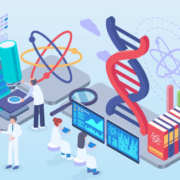
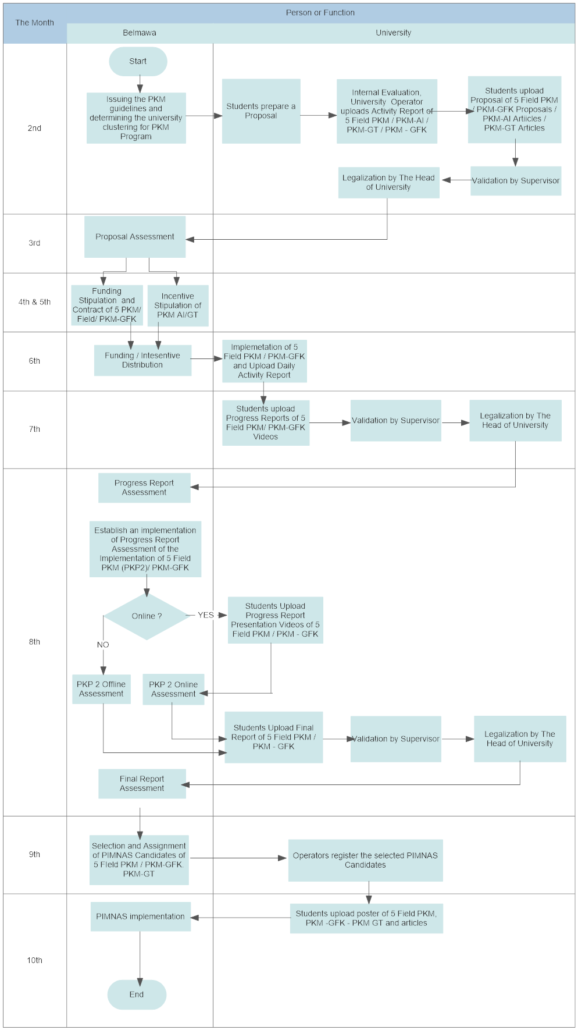
 IP IE UII
IP IE UII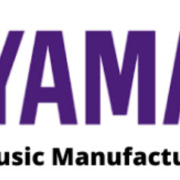 IP IE UII
IP IE UII IP IE UII
IP IE UII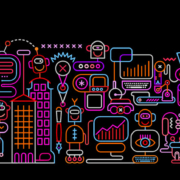
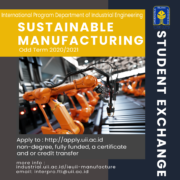
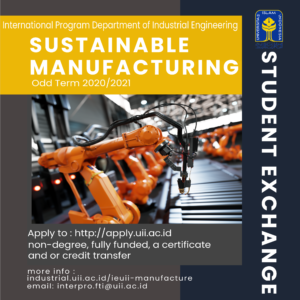
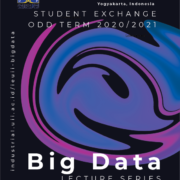 IP IE UII
IP IE UII